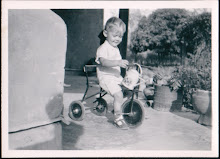

My “football career” spanned thirty years. Never a star, I certainly enjoyed the sport. I inherited the joy of football from my father who had played for his school in England and had medals to prove it. I have them somewhere.
Football is Africa’s sport so I was never at a loss for teammates. At Kawama Mission we had a huge front “lawn” made of wiry and tough lunkoto grass that could take a beating. Every afternoon at about four o’clock when the sun’s strength was starting to fade my African friends from the mission and nearby villages would show up for the match of the day. There was Johnny Wangobele, Bedford Kashiya, Kosam Mulenga, Katebe Kafwanka, and others. I had the ball – a stitched leather sphere into which a rubber bladder (like a strong balloon) was inserted and pumped up with a bicycle pump. When it was inflated the opening was laced shut and we were ready to go. We played our hearts out until dusk.
Occasionally Dad would join us and that was a treat. He would dazzle us with his skills and over power us with his shots from either foot. On one memorable day we had moved the pitch to the wide driveway in front of the house. Usually Dad would play with some restraint but on this day he decided to take a real shot. The ball sailed over the goalie and towards the house, coming to a sudden stop amid the shattering of glass in the living room window. My mother was preparing dinner in the house and came rushing to the broken window demanding an explanation for this destruction. All I could think was, “Glad it wasn’t me!”
In high school I played full back in the old 5-3-2 format. I did not have finesse nor was I quick but I did have strong legs. The sweeper concept was yet in the future so my job was simply to keep the ball away from the goal and get it up field. That involved intimidating the opposing forward to give up the ball and clearing it as far down the field as I could. In one memorable moment I was all that was left between the ball and the goal and I managed to kick it out before the ball went in. Afterwards the coach came up and said, “Where is my friend Kruse?”
At Carleton College I offered my skills to the coach, Mr. Dyer-Bennett whose name, I discovered, you did not shorten! I fancied that I would like to play forward although I was not quick. However it proved to work out. I had a good cross kick from the right wing and my center forward, Bill Lovell from Massachussetts, was very good at putting them in the goal. I had to give up football after my sophomore year. I had never had to train so much for a sport – three hours training and practice every day and matches twice a week, some far away, meaning that I had to skip classes. It affected my academics and I had to make a choice. It was not a hard choice but I did miss playing real football.
In those years the Carleton soccer team drew more fans that the Carleton football team. The soccer Knights made the college proud with winning season after winning season in the MIAC conference. The Football Knights usually struggled to win more than two games a season. We relished our superior record!
My final attempt to play competitively was in my thirtieth year. I saw a small article in the local community paper about a men’s league. It provided a phone number for me to call. The guy on the other end was twenty four and obviously had doubts about my abilities as an “old guy”. However he told me where and when to show up. I did and he was right. I was beyond competitive football. I would have to satisfy myself by kicking around with my children in the years to come (not all bad, by any means) and eventually being drawn into a Fantasy Football league.
© 2008 Roy Kruse

 In my high school years at Luanshya our family had access to the Olympic Pool (see picture) which was part of the recreation facilities for the Roan Antelope Copper Mine employees. Many hours were spent there. The pool also sported a set of diving boards – one, three, and ten meters, the first two being springboards and the latter a platform. Some of the more daring (and stupid?) high school boys enjoyed jumping off the ten meter on to the three meter whose spring action would flip them about half way acoss the pool. Lawsuits were obviously not an issue in that place and time.
In my high school years at Luanshya our family had access to the Olympic Pool (see picture) which was part of the recreation facilities for the Roan Antelope Copper Mine employees. Many hours were spent there. The pool also sported a set of diving boards – one, three, and ten meters, the first two being springboards and the latter a platform. Some of the more daring (and stupid?) high school boys enjoyed jumping off the ten meter on to the three meter whose spring action would flip them about half way acoss the pool. Lawsuits were obviously not an issue in that place and time.











